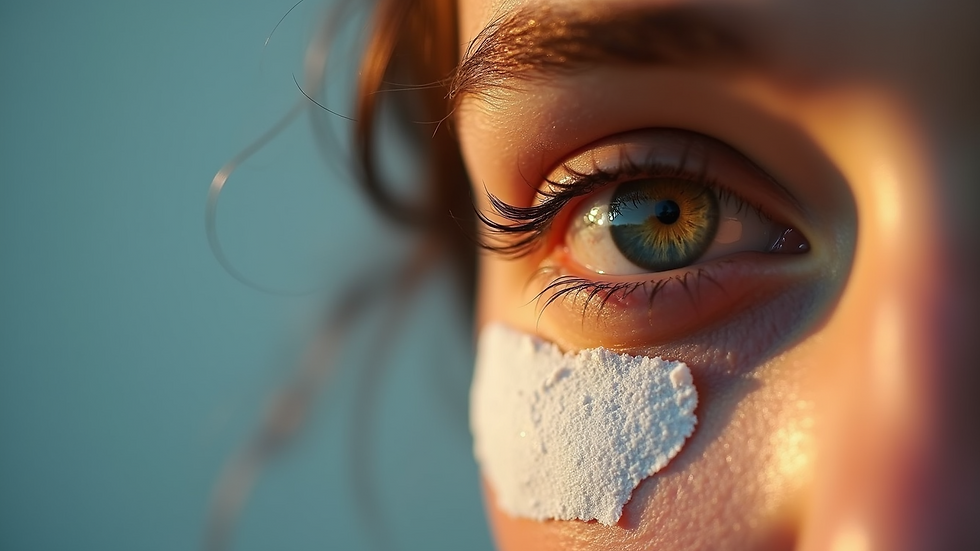Effective Treatment Options for Dry Eyes
- Dr. Waleed Bolad

- Oct 30, 2025
- 4 min read
Updated: Jan 25
Living with dry eyes can be frustrating, especially when you have arthritis or an autoimmune condition. The discomfort, irritation, and blurred vision can affect your daily life. Fortunately, there are many effective dry eye remedies available that can help soothe your eyes and improve your comfort. In this post, I’ll share practical information about dry eye remedies, including new treatments and lifestyle tips that can make a real difference.
Understanding Dry Eye Remedies: What Works Best?
Dry eye remedies come in many forms, and finding the right one often depends on the severity and cause of your symptoms. For those with autoimmune conditions, dry eyes can be more persistent due to inflammation affecting tear production. Here are some common and effective remedies to consider:
Artificial tears and lubricating eye drops: These are often the first line of defense. They help keep your eyes moist and relieve irritation. Look for preservative-free options if you use them frequently.
Warm compresses: Applying a warm compress to your eyes can help unblock oil glands and improve tear quality.
Eyelid hygiene: Gently cleaning your eyelids with a mild cleanser can reduce inflammation and prevent infections.
Omega-3 supplements: Studies suggest that omega-3 fatty acids can improve tear production and reduce inflammation.
Environmental adjustments: Using a humidifier, avoiding direct air from fans or heaters, and wearing wraparound sunglasses outdoors can protect your eyes from drying out.
These remedies can be combined for better results. For example, using artificial tears along with warm compresses and omega-3 supplements often provides noticeable relief.

Lifestyle Changes That Support Dry Eye Remedies
In addition to direct treatments, making simple lifestyle changes can support your eye health and reduce dryness. Here are some practical tips that I’ve found helpful:
Stay hydrated: Drinking plenty of water helps maintain overall moisture, including in your eyes.
Take regular breaks from screens: The 20-20-20 rule is a great habit - every 20 minutes, look at something 20 feet away for 20 seconds.
Blink more often: When focusing on screens or reading, we tend to blink less, which worsens dryness. Remind yourself to blink fully and frequently.
Avoid smoke and irritants: Smoke, strong winds, and pollution can aggravate dry eyes.
Manage your autoimmune condition: Since inflammation plays a big role in dry eyes, keeping your underlying condition under control is crucial.
By incorporating these lifestyle changes, you can enhance the effectiveness of your dry eye remedies and enjoy more comfortable eyes throughout the day.
What is the new treatment for dry eyes?
Recent advances in dry eye treatment have brought promising options, especially for those with chronic or severe symptoms. One of the most exciting developments is the use of prescription medications that target inflammation directly in the eyes. These include:
Cyclosporine eye drops: These help increase tear production by reducing inflammation on the surface of the eye.
Lifitegrast: Another anti-inflammatory eye drop that can improve symptoms and tear quality.
Intense Pulsed Light (IPL) therapy: Originally used for skin conditions, IPL is now being applied to treat meibomian gland dysfunction, a common cause of dry eyes. It helps improve oil gland function and reduce inflammation.
Punctal plugs: These tiny devices are inserted into tear ducts to block drainage, keeping tears on the eye longer.
These new treatments offer hope for those who have struggled with traditional remedies. If you’re interested in exploring these options, it’s important to consult with a specialist who understands the connection between autoimmune diseases and dry eyes.

How to Choose the Right Dry Eye Remedies for You
Choosing the right dry eye remedies can feel overwhelming, but it doesn’t have to be. Here’s a simple approach to help you find what works best:
Identify your symptoms and triggers: Keep a diary of when your eyes feel dry or irritated and what might be causing it.
Start with basic remedies: Use artificial tears, warm compresses, and eyelid hygiene first.
Incorporate lifestyle changes: Hydrate, take screen breaks, and protect your eyes from irritants.
Consult your healthcare provider: If symptoms persist, ask about prescription options or advanced treatments.
Monitor your progress: Adjust your routine based on what helps the most.
Remember, dry eye remedies are often most effective when combined. Don’t hesitate to try different approaches and give them time to work.
Encouragement for Managing Dry Eyes with Autoimmune Conditions
Living with dry eyes alongside arthritis or autoimmune conditions can be challenging, but you’re not alone. Managing dry eyes is a journey, and every small step counts. By staying informed and proactive, you can reduce discomfort and protect your vision.
If you’re looking for personalized care and expert advice, consider reaching out to specialists who understand the complexities of autoimmune-related dry eyes. They can guide you through the best treatment for dry eyes tailored to your needs.
Your eyes deserve the best care, and with the right remedies and support, you can enjoy clearer, more comfortable vision every day. Keep exploring your options and stay hopeful - relief is within reach.




Comments